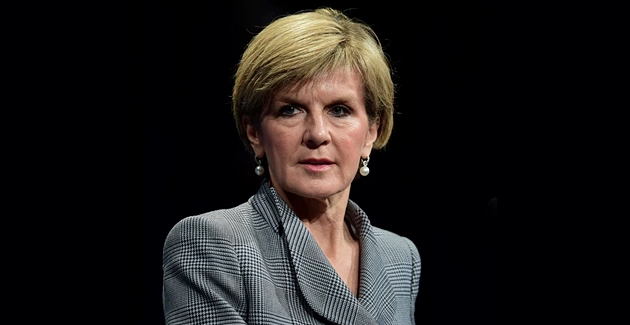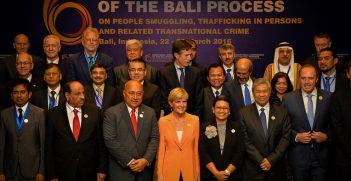Without Diplomatic Action, Australia’s Human Rights Council Bid is Futile

Foreign minister Julie Bishop’s visit to the Philippines earlier this month has added another question mark to Australia’s bid for a seat on the United Nations Human Rights Council. If Australia wishes to use its seat for the promotion of human rights globally, how can it continue to ignore the violent abuses by nations in its own region?
On the webpage dedicated to Australia’s bid for a seat on the United Nations Human Rights Council (UNHRC), the Department of Foreign Affairs and Trade (DFAT) claims “our inaugural candidacy reflects our commitment to the aims and purposes of the Universal Declaration of Human Rights and to the ongoing promotion and protection of human rights.” While candidacy itself may reflect that commitment, Australia’s diplomatic and domestic actions do not. Foreign minister Julie Bishop’s visit to the Philippines this month provided a glaring example of this double-standard. Troubling consequences will arise from this inconsistency, both for the bid’s prospects and Australia’s legitimacy if elected to the council.
Australia’s weakened pitch
The UNHRC declares it is “responsible for strengthening the promotion and protection of human rights” and “addressing situations of human rights violations and mak[ing] recommendations on them”.
Since the official launch of the UNHRC campaign by Julie Bishop in 2015, Australia has been in the running for one of the two seats available to the Western Europe and Others group (WEOG) of the United Nations General Assembly. Australia is competing against Spain and France for a three-year term on the council between 2018 and 2020 and must secure enough votes from other members of the General Assembly to ensure election.
Currently, Australian officials and politicians cite a carefully curated selection of “pillars” as the basis of the bid.
Within the scope of the “promotion and protection of freedom of expression” pillar, DFAT points to the abolition of the death penalty as being integral to its commitment to human rights. Further, the foreign minister’s own office has published press releases and made repeated statements that situate the “global abolition of the death penalty” at the very core of Australia’s human rights objectives. This provides the most glaring example of Australia presenting to the UNHRC a version of itself contradicted by its actual diplomacy.
By meeting with President Duterte in the Philippines as she did, the Julie Bishop has handed both regional and global legitimacy to a regime openly besieging its people’s right to freedom of expression through extra-judicial killings. The Southeast Asian leader has been condemned by both Human Rights Watch and the UN High Commissioner for Human Rights Prince Zeid Ra’ad Al Hussein. The latter argues that Duterte’s acts—both as mayor of Davao and president of the Philippines—“violate international law”. According to Amnesty International, since Duterte’s election in June 2016, certain police officers have been paid between $212 and $400 for each drug suspect slain; more than 7,000 have died in the same period.
No public statement against President Duterte’s reinstated and liberally exercised death penalty was issued by Bishop’s office. Instead, the two met in Davao City, Duterte’s bastion, to discuss the threat of extremism, unrest in Mindanao and cooperation on sustainable mining practices. Presidential spokesperson Ernesto Abella characterised the meeting as “warm and cordial” and as having “set the tone for more positive engagement”.
Australia cannot tout the shining virtue of its human rights pillars while concurrently meeting with a regime that overtly abuses fundamental human rights as if nothing were the matter. It is a simultaneously confused and confusing foreign policy. An observer’s confusion would be heightened by DFAT’s claim that “we are already leaders in promoting improvements, particularly in the Indo-Pacific”.
While the Philippines is an incredibly important strategic partner and cutting ties with Manila is unfeasible, applying consistent public and diplomatic pressure is not. Bishop’s own success with Vladimir Putin during the Ukrainian MH17 disaster shows that the current government can effect significant change during diplomatically precarious situations that threaten human rights, even ones that involve volatile strongmen.
Can Australia make a difference?
The UNHRChas been censured by critics for repeated examples of obstructionism and bloc voting by a coalition of countries often noted for their murky human rights records. This coalition, known as the Like-Minded Group (LMG), is made up of countries including Russia, Egypt, Saudi Arabia and Cuba. Known for resisting advances in norms and practices, attacking well-established norms, stifling civil society groups and pursuing controversial parallel resolutions, these nations are generally authoritarian and deeply conservative, targeting women’s and LGBTQI (lesbian, gay, bisexual, transgender, queer or questioning and intersex) rights in particular. According to DFAT, the LMG attempted 31 hostile amendments in 2016 alone.
While the LMG’s involvement makes the UNHRC weaker than it could be, a successful Australian candidacy would nonetheless result in a uniquely positioned, enthusiastic new member of the council; one that could grease the wheels on select issues considered too difficult for other members.
Even before the announcement of its candidacy, Australia has earnestly engaged with the UNHRC. As a member of the UN General Assembly, Australia has used its influence and access to limited official channels to co-sponsor, amend and indirectly float ideas for resolutions. In March 2016 alone, Australia co-sponsored 17 of the 40 resolutions tabled by the UNHRC. Furthermore, the Australian delegation has a history of putting its name to joint statements condemning abuses. Australia was one of 12 countries to sign onto the “public joint statement on the human rights situation in China”, a document expressing concern about the Chinese government’s human rights record.
As encouraging as this early mobilisation may be, it grows hollow as Australia continues down the path of indifference to human rights abuses when dealing with countries on a bilateral basis. Australia’s UN track record shows that it can stand against the hostile elements of the UNHRC. It needs a regional diplomatic track record to match
Negative consequences
Not only does Australia’s myopic track record jeopardise its chances of ascension to the UNHRC, it also weakens the authority of its position as a member should its bid to prove successful.
Australia’s UNHRC bid is still worthy of pursuit, but the nation must strengthen its commitment to human rights issues—both at home and regionally—by increasing funding to domestic programs and refusing to turn a blind eye to the misdoings of its partners in the Asia-Pacific. Otherwise, the Australian delegation may find itself with scant votes and little influence.
Ante Malenica is the outgoing editor of the AIIA’s blog, Australian Outlook. He is completing a master of international relations and a master of international law at the University of Western Australia.
This article is published under a Creative Commons Licence and may be republished with attribution.





